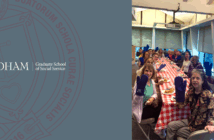What is Public Interest Technology?
Technology is not inherently bad; it’s a tool. In many cases, technology does good things—it can automate boring tasks, connect us with others all over the world, and help more equitably distribute resources.
However, even free tech tools come at a price, and we must question technology’s challenges. Is there bias baked into the apps we use? What’s happening to our data when social media companies track our video watch times, and everything requires an email signup? Why do so few companies hold so much power in return for their services and platforms?
Enter Public Interest Technology (PIT), an approach that tries to shift the paradigm of “innovation at any cost” and urges ethical and responsible action when creating and using technology.
As a Jesuit University, Fordham fuses ethics into every student’s education. And our New York City location positions us to serve as a leader in public interest technology development. This commitment was made manifest on Monday, April 29, at the University’s inaugural Public Interest Technology Gathering, at the McNally Auditorium.
Organized by Graduate School of Social Service Professor Lauri Goldkind, Ph.D., and Fordham Communication and Media Studies Associate Professor Jessica Baldwin-Philippi, Ph.D., the event assembled industry and academic experts to discuss Fordham and other New York area universities’ roles in the PIT landscape.
A Fight for the Future
The event began with a keynote discussion between Afua Bruce, author of The Tech That Comes Next, and Fordham Law Professor Zephyr Teachout.
While Fordham may have renowned liberal arts roots, moderator Baldwin-Philippi said, it is not an engineer-heavy school. How can it make an impact in a STEM-dominated field?

Afua Bruce
“We need tech and non-tech expertise to come together and tackle problems like climate change and criminal justice reform,” Bruce said. “Seek out ways to build cross-functional partnerships…Now is the time.”
But what is the path forward once those partnerships are forged? What meaningful changes should those in the PIT space be focused on?
Teachout said ethical tech management could mitigate the likelihood of forming a “first-degree discrimination economy,” defined by Investopedia as businesses charging the maximum possible price for each unit consumed, with companies going as far as using personal data to make specific personalized pricing models. She cited Wendy’s recently introduced (and then walked back) dynamic pricing model as an example of more companies “dipping their toe” into this structure, and using data against their customers and employees.
“If you know someone is in debt, you can maybe pay them less,” she said. “[Uber] Riders with low phone batteries get higher charges [because they won’t be able to call another ride soon].”
Teachout’s concern stems from power structures. She advised everyone in the room to take note of corporate partnerships and acquisitions and question if this is good for the future.
“It’s about power — not just what is being done but who is doing it,” she said. “Like the relationship between Microsoft and Open AI…who owns the potential for the future? This really is a fight for the future.”
How Transparency Can Work with Innovation
One way tech companies can align with PIT goals is through transparency. However, it’s not enough for Google to show you a few lines of code from a new feature, Bruce said. That information needs to be interpreted and analyzed for outcomes.
She cited a recent case where MIT scientists discovered a new antibiotic—the first discovery of its kind in 60 years—using generative AI. What was key, however, was access to the algorithm.
“A key innovation of the new study is that the researchers were also able to figure out what kinds of information

Zephyr Teachout
the deep-learning model was using to make its antibiotic potency predictions,” MIT News said. “This knowledge could help researchers to design additional drugs that might work even better than the ones identified by the model.”
However, Bruce said companies and their engineers aren’t always open to showing what’s under the hood.
“People say ‘we can’t tell you what’s inside,’ or ‘it will take too long to tell you.’ – this [MIT] research showed you can be transparent doing this,” she said. “But sometimes transparency isn’t helpful, especially if you can’t interpret it. You need to pair transparency with the ability to interpret what the algorithms mean.”
“Lawsuits are great transparency generators,” Teachout added.
Regulations are NOT Anti-Tech!
Most CEOs will tell you regulations stifle innovation. They’ll say that if tech companies have to jump through too many governmental hoops, more will choose not to make cutting-edge products. But is this true?
“Regulation is not separate from innovative product design,” Teachout said. “Regulatory innovation is design innovation.”
You have to align incentives across stakeholders for success, Bruce said. She recalled a change Google made to its Pixel phone, which had struggled to capture those with dark skin in pictures and videos properly. Google heard its customers’ issues and took the phone’s design back to the drawing board.
“Google worked with photographers and changed the development process to make it better,” Bruce said. “This is an example of aligning incentives. People from different sectors all work together to develop something that does good for a lot of people.”
Teaching and Researching “Tech for Good”
The event hosted two other panels focused on teaching and researching PIT at the university level, as well as a workshop presented by BetaNYC on how to teach with open data.

Lauri Goldkind
“We make it too hard to study and work across disciplines [at colleges and universities], but the problems we have are inherently cross-disciplinary,” Goldkind said.
This event is one of the first of hopefully many steps to make that collaboration easier for future students. And while PIT may now struggle to determine whether it is an official discipline or an open community, for academic PIT members, educating students about ethical technology is the top priority.
Those students will staff the Googles and Metas for years to come, and institutions that embrace PIT will give them the tools they need to ensure these tech behemoths don’t dehumanize society.
Represented in attendance were members of the Fordham community across disciplines: Communications, Social Work, the Law School, the Gabelli School of Business, the Center for Community Engaged Learning, Medieval Studies, Fordham College Lincoln Center, Grad Religion and more. Additionally, the Borough of Manhattan Community College, Hostos Community College, Cornell Tech, CUNY Grad Center, CUNY St. George, Hunter, NYU Tandon, Arizona State University, and Case Western Reserve were represented, as well as nonprofit organizations BetaNYC, the Wikimedia Foundation, and the Bronx Tech Hub.



